Food Studies News
Committed to Student Success
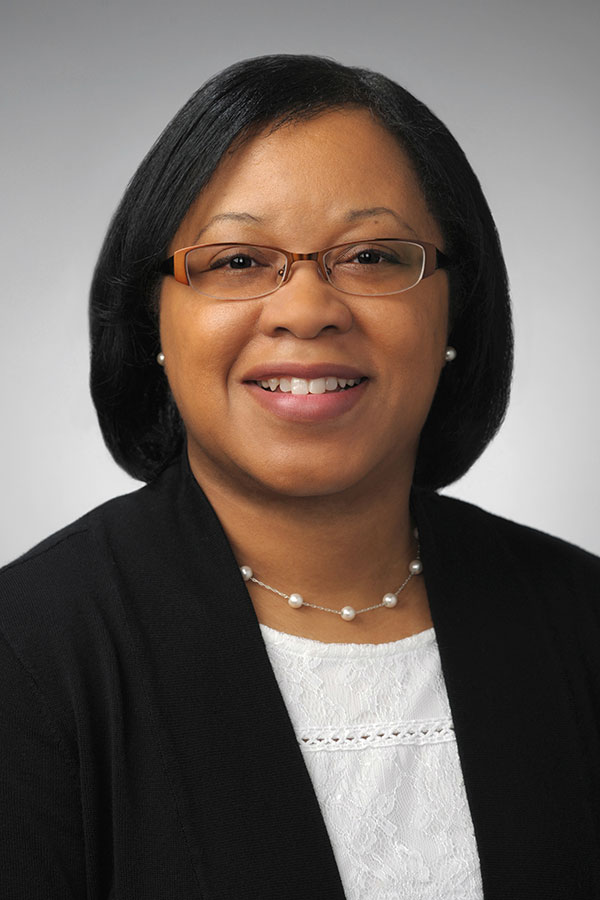
As a non-traditional, first-generation undergraduate student at Syracuse University, Chandice Haste-Jackson excelled academically but always felt there was something missing in her pursuit of knowledge.
That missing piece? Connecting with others.
“Ultimately, I discovered that in connecting with others, I could expand my knowledge and understanding beyond anything I learned from textbooks,” Haste-Jackson says. “That set me on a career journey oriented toward human connection, holistic development, and service, whether that be in fields of teaching, counseling, leadership, or administration.”
This past summer, Haste-Jackson’s lifelong journey of connecting with others continued with her appointment as Associate Dean of the Office of Student Services in Falk College. An associate teaching professor in Falk’s Department of Human Development and Family Science (HDFS), Haste-Jackson previously held several prominent HDFS positions and was chair of the Dean’s Committee on Diversity and Inclusion. In 2021-22, Haste-Jackson served as Syracuse University’s interim director of the First-Year Seminar course.
Before joining Syracuse University, Haste-Jackson was drawn to work that supported vulnerable populations. It was her job, she says, to help those populations expand their understanding, move from deficit toward sufficiency, and identify what wholeness, health, and stability meant to them and/or their families.
“Was this difficult work at times? Yes!” Haste-Jackson says. “But what I gained from these experiences is that our humanity connects us all, even those who are not like ourselves. We all want similar things–health, happiness, longevity, stability–and that makes us more interconnected than we think we are.”
To introduce Haste-Jackson to Falk students, we asked her to discuss her previous experience with students, the services offered by the Office of Student services, and questions that students might ask. Here’s that conversation:
What attracted you to your new job and why is it important that you’re helping Falk College students succeed?
After 20 years of working in nonprofit organizations and schools, rising through the ranks of direct service to executive leadership and administration, I spent a good deal of time teaching and training frontline employees and college student interns. In working with college student interns, I developed a desire to teach, mentor, and prepare the next generation of human service workers, a field that is very broad but one that involves human connection, holistic development, and service–tenets I live my life by!
Given the climate in which we live in today, college students are dealing with issues that may impact their ability to successfully engage in academic pursuits. The COVID-19 pandemic, mass racial violence, wars, and significant personal losses have impacted academic performance and emotional well-being. Helping students to navigate these challenges during their time with us in Falk College is what I endeavor to do, and I am committed to leading and supporting the professional staff in our office who have made that same commitment to student success.
I’m a first-year or transfer student who isn’t familiar with the Office of Student Services. What are the services you provide?
In your first year at Syracuse University, our office will provide academic counseling and advising around other areas in your life that you identify as being important to your growth as a student in Falk College. Additionally, our office supports career exploration and professional skill development, and offers opportunities for learning through career immersion experiences.
Every first-year and transfer student has an assigned academic counselor, and the Office of Student Services will be one of the first places that you connect with to learn more about your major and all the resources available at Syracuse University.
I’m a student struggling with my classes and I’m not sure if I’ve chosen the right major. How can you help?
This is common for students who are adjusting to the intensity of college-level work. We can help you identify the source/cause of the struggle with your classes and then locate campus resources that you might consider accessing for help.
Sometimes, making a change in how you study, how much time you give to studying, or even where you study is all that may be needed to alleviate the struggle. Sometimes, motivation is at the root of the struggle and subsequently causes you to consider if the major is right or not. We’ll help you to explore and develop a pathway to successful academic performance.
I’m a student having a hard time being away from home and I’ve got personal issues that are getting in the way of my sleep, classwork, and social life. Do I go to you or somewhere else?
You most certainly can meet with your academic counselor to discuss these personal issues. Our academic counselors will listen and help you find the resources that are right for you and meet your needs. You do not have to be alone in trying to address emotional, social, or academic well-being.
We also recommend that students contact the Barnes Center at The Arch and/or Hendricks Chapel for support with any personal issues that arise. We are well-connected to these two resources and support student engagement with their services.
Why is it important for students to see you if they have issues rather than trying to work them out on their own? Isn’t that what college is for, learning how to handle stress?
Absolutely! Learning how to handle stress is an expectation of a college student, yet many students are not prepared for the inherent stress that comes with transitioning to college. During the first year of study or even subsequent years, there are a series of social, emotional, and academic adjustments that must occur for you to be successful as a college student. There will be some new stressors, and some of your past ways of handling stress may not be as effective for you now.
Being proactive in seeking help before something becomes an issue is also something that college students are expected to learn early in their college career. We can help you to learn these skills and support you along the way as you employ them.
Help is Here
The Falk College Office of Student Services is in Suite 330 Barclay Hall. You can visit at any time or schedule an appointment by calling 315.443.3144 or emailing falkss@syr.edu. Visit the Office of Student Services webpage for more information and a complete list of services, important announcements, and staff directory.
Lessons from the Farm Stand
About an hour north of the Syracuse University campus is a farm stand bursting with vibrant, colorful vegetables, where goats and chickens roam free and customers try their best downward dog at yoga classes in a hops field.
This is Forty Roots Farm Stand, a farm stand owned and operated by Chaya Lee Charles ’04, G’14, assistant professor of nutrition in the Department of Nutrition and Food Studies. Charles opened the farm stand in 2020 with her husband, Martin, a high school culinary arts teacher, and a friend who has a background in agricultural science.
“Getting students out of the classroom and sharing my experience at Forty Roots is crucial to getting them excited about working in the field and thinking about how they want to use their degree in the future,” says professor Charles.
The farm is a welcome counterbalance to the hustle and bustle of academic life, and it provides Charles with real-world lessons she shares with her students in the classroom. “My work on the farm has given me hands-on experience that I can share with my students. When I’m talking about food science, the nutritional quality of food, how soil health impacts that and all those things in my courses, I now have tangible experience of how that works,” Charles says.
The agricultural setting is not only perfect for growing organic vegetables, but for bringing some important lessons to her students and her community work.
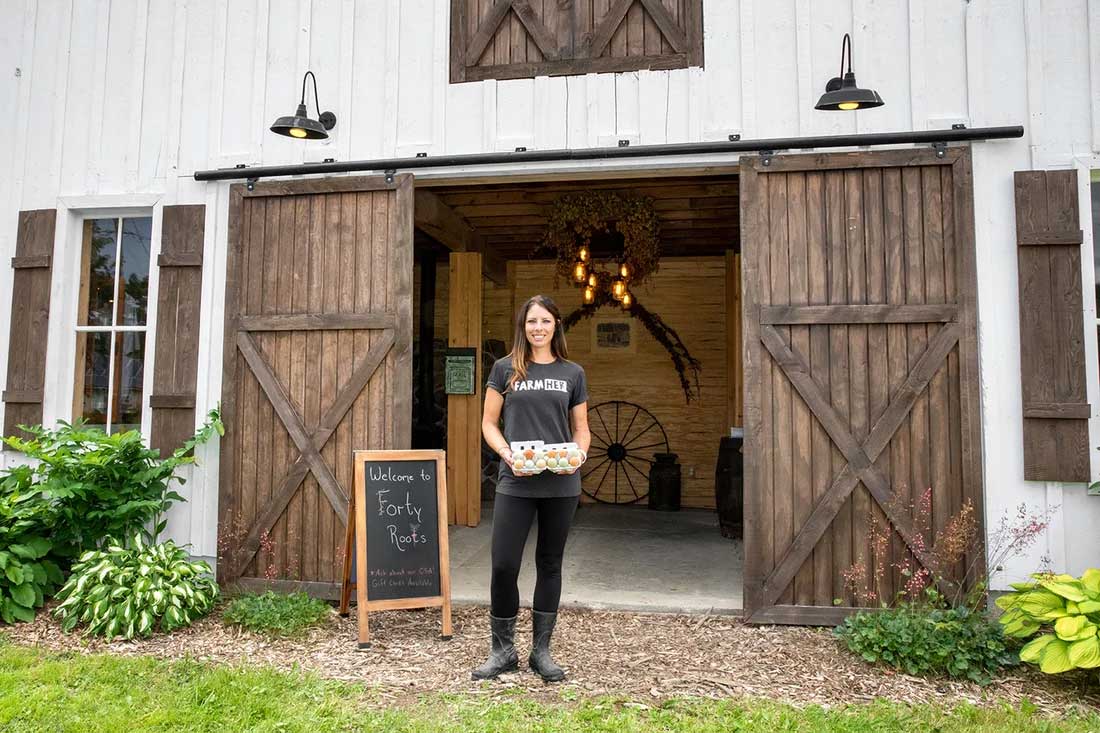
Digging in the Dirt
Charles teaches nutrition education in Falk College, including courses on food science, nutrition education, weight management and disordered eating. “One of my goals as a teacher is to always bring real-life scenarios into the classroom so students can learn via hands-on experience,” Charles says.
Among the work she does in the community is with Parkinson’s disease management, an area she became interested in from working with older adults as a practicing dietitian in long-term care and assisted living facilities. She works with Empower Parkinson, an organization in Syracuse that helps people with the disease to maintain their functional abilities. “At Empower Parkinson, we provide alternative and combination therapies to help people manage their Parkinson’s disease symptoms,” Charles explains.
A group of students work with Charles and Empower Parkinson through a gardening program called Planting for Parkinson’s, a community garden that grows food that’s been linked to potential benefits for people living with Parkinson’s disease.
“At Empower Parkinson, we provide alternative and combination therapies to help people manage their Parkinson’s disease symptoms,” says Charles.”
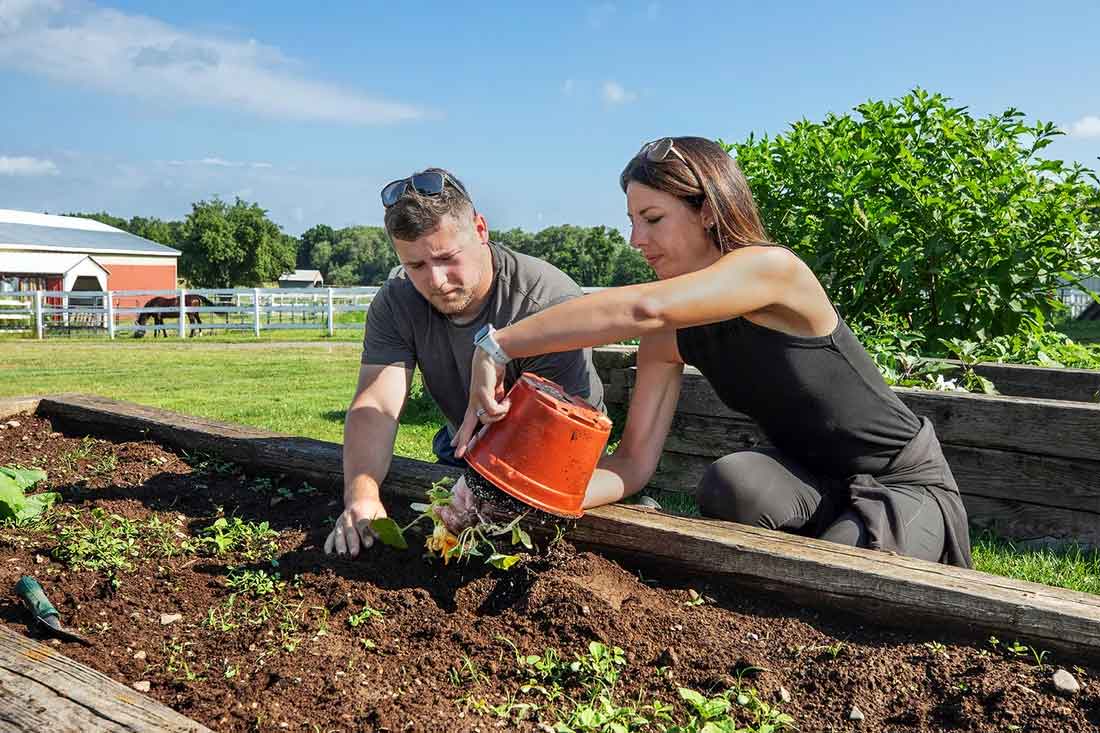
Nutrition major Philip Farina ’23 has been working with Charles this summer in the garden. Though he began doing the work as part of a class project, he volunteered to continue with the program after the course ended and says the experience is personal as his grandmother had Parkinson’s disease.
“I’ve enjoyed working with Professor Charles this summer,” Farina says. “I’m learning about nutrition program planning, volunteer coordination, and I’ll be conducting education sessions too.” Farina plans on becoming a registered dietitian and says the planning and community education experience he’s gotten this summer are important skills he’ll be able to apply to that career.
Charles has multiple avenues for students to explore their food passions. She has led a student group in working with the Syracuse City School District, assisting their dietitian to create a fruits and vegetables campaign for the elementary schools in the district. “My main goal for students taking my classes is to leave with increased interest and curiosity on the topics we discuss, as well as an improved sense of how to apply acquired knowledge in settings within the field,” says Charles, now the advisor for the student group Slow Food, which focuses on supporting local food and traditional cooking.
Another group of students has worked with the Sustainability Management office to develop pamphlets on how to utilize the Hendricks Chapel Food Pantry and created easy-to-follow recipes using fruits and vegetables from the University’s community garden. “Those are things that could be available at the campus food pantry to help students,” Charles explains.
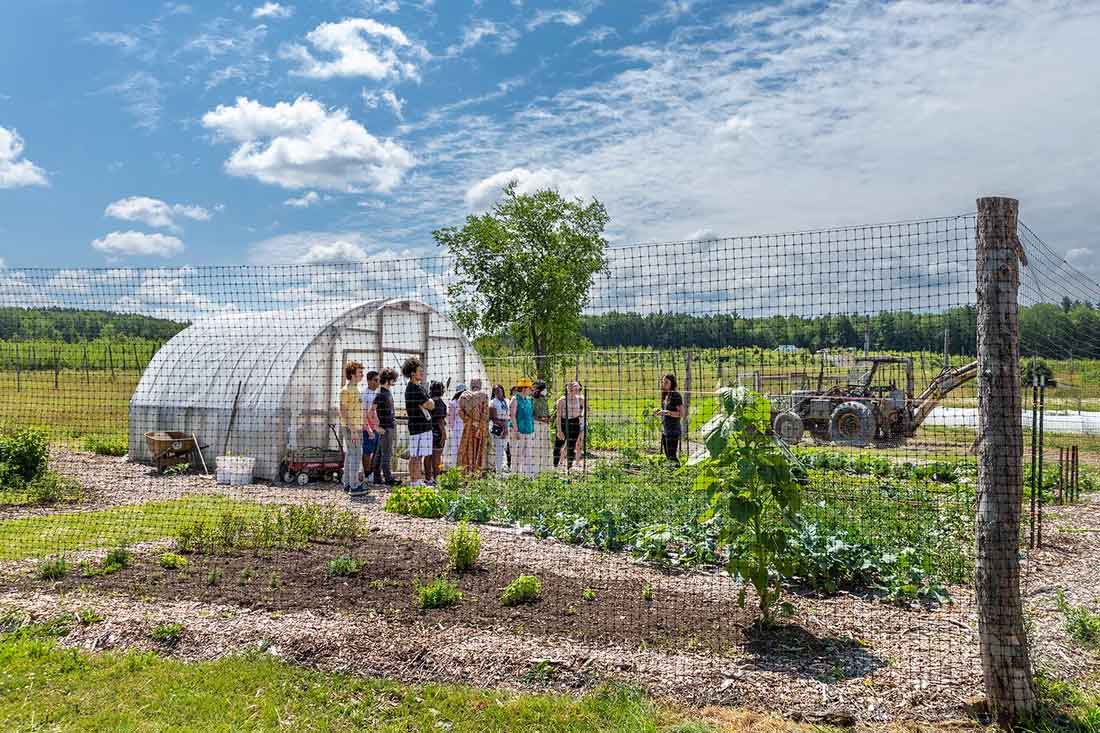
Nutrition for the Next Generation
Charles is also involved with another community garden on campus, Pete’s Giving Garden, which harvests produce for the food pantry. Her involvement is fueled by her passion for gardening and nutrition in general. “Nutrition is so crucial for good health—more so than people understand.”
Her passion for the field and her interest in preventative nutrition was strengthened after the birth of her son, now 9 years old. Consuming fresh, whole, unprocessed, organic foods is especially important, says Charles, to avoid disease later in life.
“As a dietitian, I try to bring the nutrition component into what we’re growing and chose foods to grow that have the best nutritional profile for our customers, and then I provide them with nutrition information on the items and healthy recipes of how to use them,” says Charles.
Charles offers community-supported agriculture (CSA) through Forty Roots and the trio is working on opening a café at the farm stand, revitalizing the hops and will soon build a greenhouse for winter gardening. The property used to be a horse farm and then a hops farm before Charles and her business partners bought it. “There’s so much time and effort that goes into organic growing, so when you get a great end product it’s pretty satisfying,” Charles says. She also brings her nutrition expertise to the CSA boxes they provide. With each weekly box customers receive, Charles includes recipes, healthy tips and instructions on how to use the vegetables.
Though one of the greatest rewards, says Charles, is when her students come back and tell her that they’ve applied the knowledge they gained through her classes and experiences in their post-grad work. “Getting students out of the classroom and sharing my experience at Forty Roots is crucial to getting them excited about working in the field and thinking about how they want to use their degree in the future.”
A Syracuse University Story by Lisa Maresca originally published on September 6, 2022.
Dean Murphy Welcomes Falk Students
Dear Falk Students,
Finally, our beautiful campus is packed with energy after the quiet summer months. It’s great to see our returning Falk students—we’re so glad to have you back! Please join me in giving a big Orange WELCOME to the Class of 2026, and to our new transfer and graduate students! Our Falk family just got a whole lot bigger.
As we share in the excitement of a new semester, I want to remind you of some important information that will help you navigate life on campus.
Official Syracuse University Communications
Syracuse University email is the primary communication method at the University. Your professors and University offices will contact you with important information using your Syracuse University email address (ending in “@syr.edu”), not your personal email address. It’s important to read your University email at least once every day so you’re aware of the latest information that’s essential to you.
Public Health Information
Public health remains a critical priority for life on campus. Please review the Fall 2022 Public Health Guidelines. We fully expect all Falk College students to follow University public health guidelines. For public health information and updates, please visit the Stay Safe website, the official source of public health information for Syracuse University. Thank you for doing your part to keep our community safe and healthy.
Student Support Services
Falk College Student Services is an important resource in your support system at Syracuse University. Student Services counselors are here to provide you with academic advising and help you meet your requirements and goals. In addition, they are your resource for private consultation related to student social and emotional concerns. If you have any concerns throughout your academic career, please contact Student Services or visit Suite 330 Barclay Hall in the Falk Complex.
I encourage you to connect with the staff at Falk Career Services, who can help you prepare for life after college through career exploration, internship and job searching, professional networking, and more. They are also located in Suite 330 Barclay Hall, or you can search for opportunities through Handshake, the University’s job search and professional events portal.
In addition, you can connect to spiritual life on campus at Hendricks Chapel, as well as health and counseling services in the Barnes Center at the Arch.
Student Spaces in Falk College
The Student Lounge, located in Falk 216, is available to you anytime the Falk Complex is open. The lounge has a microwave, refrigerator, and vending machines for student use. Across the hall is the Falk Café on 2, open 8:00 a.m. to 3:00 p.m. Monday through Thursday and 8:00 a.m. to 2:00 p.m. Friday starting September 6. Visit the Food Services website for up-to-date operating hours for cafés and dining centers across campus. Just down the hall is Falk 229, the quiet student lounge.
There are several computer labs in the Falk Complex. Falk 113 is a PC lab, and Falk 229 is a quiet study area that has both PCs and Macs available for your use. Both spaces are available to students at any time. Falk 400 and 407 are PC labs that are also used as teaching classrooms. When class is not in session, they are open for student use. You may check their schedule of availability using the 25Live website. You may also use the quick-print stations in Falk 216 and 229 for printing and email. These stations log out automatically after 15 minutes of use.
Ways to Get Involved
The Student Involvement Fair will be held Thursday, September 8, on the Quad from 4:00 to 7:00 p.m. There are more than 300 student organizations at Syracuse University. Be sure to explore organizations that might be outside your usual interests, too. Remember, this is a great way to meet new people and discover something new about yourself!
There are many exciting events planned for Fall 2022, including two signature Syracuse University events: Family Weekend October 14-16 and Orange Central, Syracuse University’s annual homecoming and reunion weekend, September 29-October 2. You can discover activities and events on campus by visiting the Syracuse University Calendar.
There are so many ways to connect, express, and grow at Syracuse University, and these are just a few suggestions to get you started. I encourage you to visit the Syracuse University For Students page for more resources and opportunities to make the most of your Syracuse experience.
I wish you the best as you begin (or continue) your Orange story. Best of luck to each of you. We’re excited to see all that you will accomplish this year.
Go Orange!
Diane Lyden Murphy, M.A., M.S.W., Ph.D.
Dean
Falk College
Welcome Class of 2026
Welcome to Syracuse, new Falk College students! The newest Falk students in the Class of 2026 are a talented group from 30 states and 18 global countries. We welcome 386 first-year and 14 transfer students who join new graduate students, 141 in residential programs and 244 online. We’re glad you’re part of the Falk family. Altogether, the Falk College student body is 2,140 strong!
We look forward to meeting with you, your families, and friends at Syracuse Welcome August 25-28, 2022. It will be an exciting time of meeting new classmates and professors, and discovering all that our campus and region have to offer.
Join us for important Falk College welcome events. You can also check out the main Syracuse Welcome website for information on all events surrounding Syracuse Welcome and getting moved in!
Falk College Syracuse Welcome Events:
Promoting Social Equity Through Food
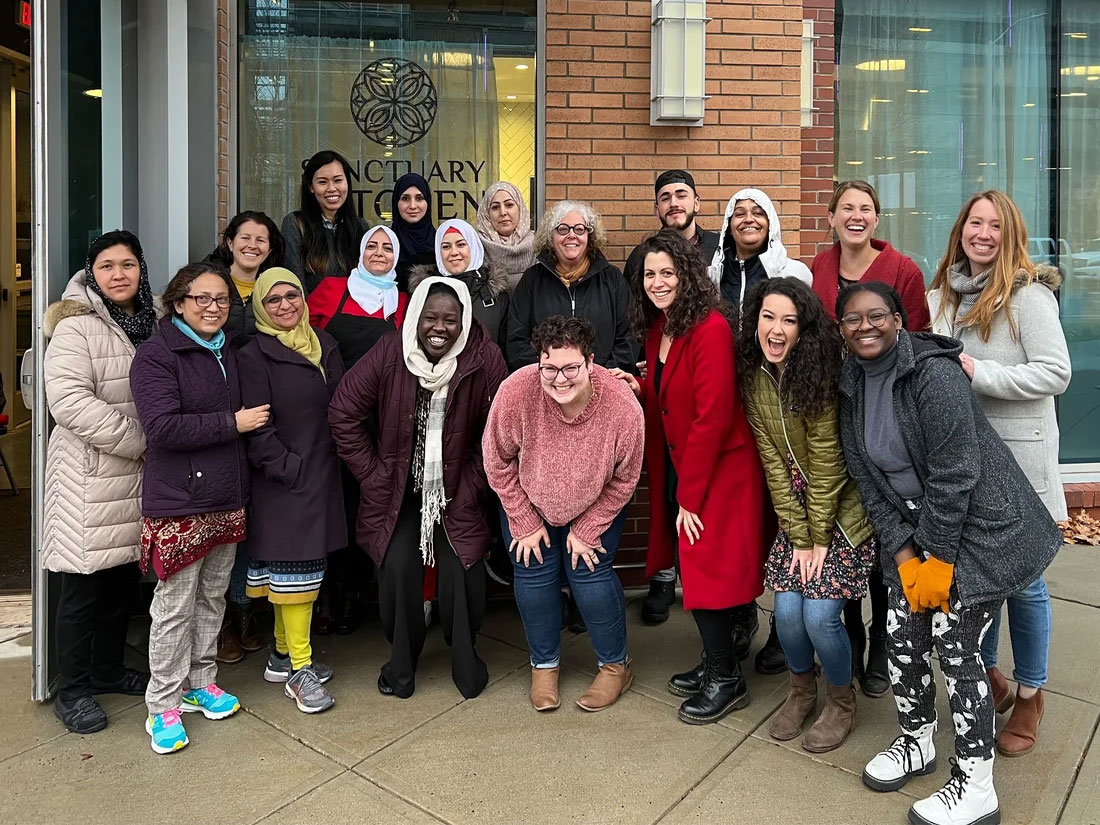
Their guiding principle, Santino explains, was that every aspect of the program be true to the goal of promoting social equity. This meant ensuring that those served by the program played a central role in shaping it, that every contributor was compensated, and that the curriculum centered the perspectives of food industry leaders from marginalized communities. The program highlighted the interconnectedness of social justice issues. “We formulated the curriculum around the injustices that overlap in the food and the prison systems, focusing on how to bring more options for healthy, culturally appropriate and affordable food into communities disproportionately affected by inequity,” they explain.
The project speaks to the essence of what drew Santino to the food studies graduate program: They sought an education that would help them work effectively at the intersection of food and social justice. And now, with a career that evolved directly from their master’s thesis, Santino leverages the insight and passion gained through years of working in the field into agency for change.
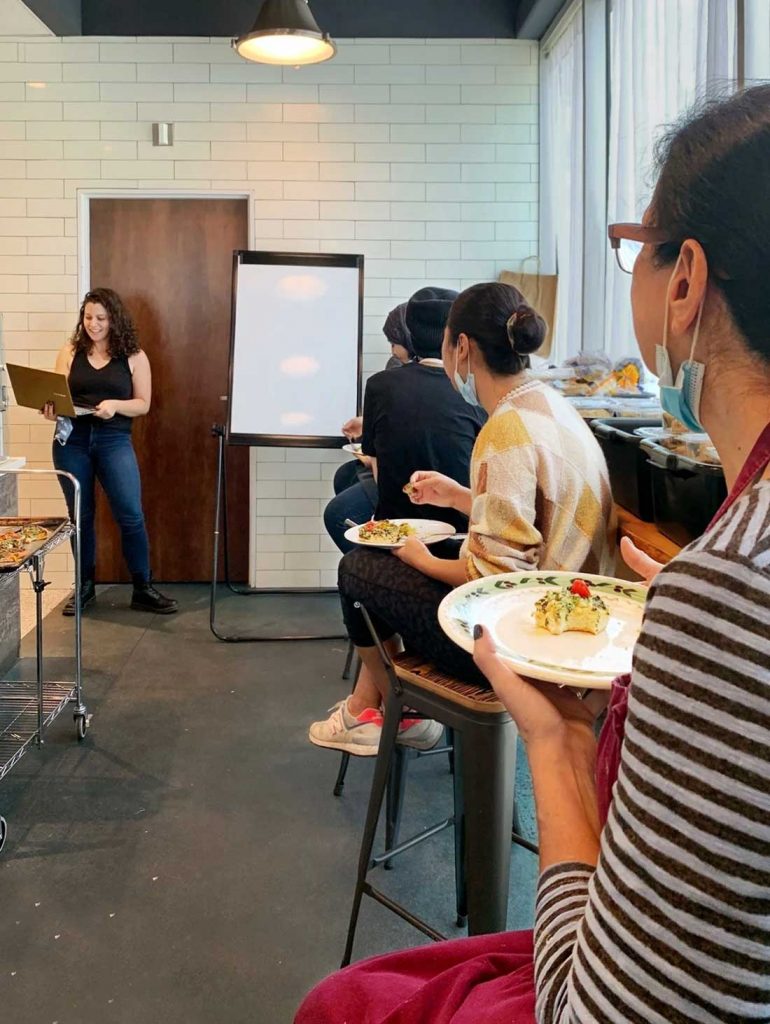
Empathy From Experience
The formative experience that set Santino on their path was the food insecurity they experienced as a youth. When Santino, who grew up just outside New Haven, Connecticut, was 11, their parents’ divorce precipitated abrupt changes that pushed Santino and their siblings and mother into poverty. And while Santino’s family gave up their car and lost their house to foreclosure, the change Santino felt most keenly was lack of food. “I grew up in an Italian American culture, and food was a central part of community. In my younger years it was always around and there was a lot of it. And then as I got older, there was significantly less.” For many years, school lunches provided their most stable and nutritious meal of the day.
Santino characterizes their middle and high school years as challenging, in part because they contended with then-undiagnosed ADHD, but they began to develop a sense of direction during their first year of community college. They took some culinary and hospitality courses and started working in restaurants. Affirmed in their interest, Santino transferred to Johnson and Wales University and earned a bachelor’s degree in culinary arts and food service management.
The education Santino received through working in the culinary and hospitality field—in a range of roles throughout college and beyond—was equally formative. While they appreciated the independence gained through work, they were increasingly troubled by aspects of the industry that conflicted with their values. Particularly disturbing, they say, was the dehumanizing work environment of some corporate establishments and the stark socioeconomic disparities between some restaurant workers and clientele.
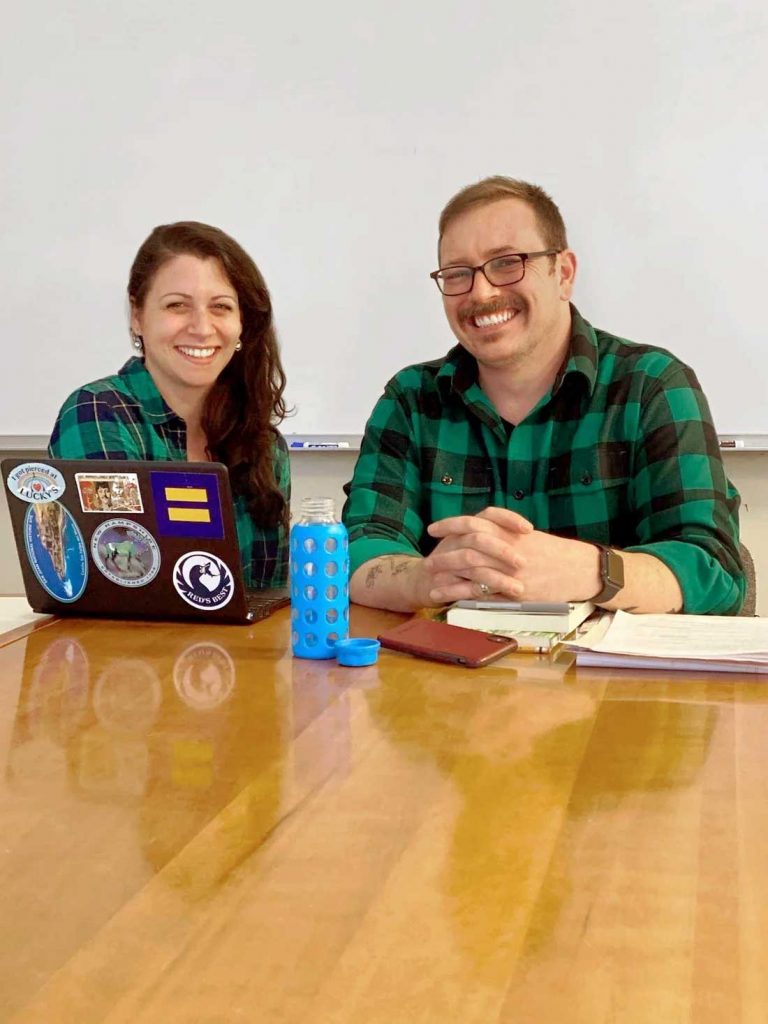
The Perfect Mix
Santino sought opportunities to work with organizations that addressed issues at the intersection of food and social justice. Their first such position was at a women’s shelter where both the food and the culture aimed to promote health, community and a sense of dignity for all involved. They also worked at a nonprofit that provided a bakery training program for formerly incarcerated people. The emphasis on culinary arts as a means to financial security resonated with Santino, and the role provided an eye-opening education into the incarceration system. “Having candid conversations with the returning citizens and hearing their stories helped me understand how people who have contact with the prison system get completely disregarded by society,” Santino says.
Santino discovered the food studies program at Syracuse University by chance, after accompanying a friend to a career fair. They found the program deeply compelling, characterizing it as a “perfect mix of food and social science—with a little bit of public health thrown in.” Although at that point Santino had written off the possibility of graduate school, assuming it would be financially beyond reach, they applied.
During an exploratory visit to campus, Santino met food studies and nutrition professor Evan Weissman, and the positive experience confirmed their decision to enroll. “I visited in April, and it was typical Syracuse weather—65 degrees one day and snowing the next,” Santino remembers. “I was thinking, ‘I don’t know about this,’ but when Professor Weissman showed me the food study suite and I saw the different things happening there, I knew that this was exactly where I wanted to be and what I wanted to do.”
Weissman became a mentor whose own work Santino could build on, and he served as their advisor until he died unexpectedly in 2020. “I wanted to create participatory programs, centered around food, with people who are most affected by issues of income and racial inequality. The food studies program and Professor Weissman helped me put my ideas on paper and start to imagine how to execute them.”
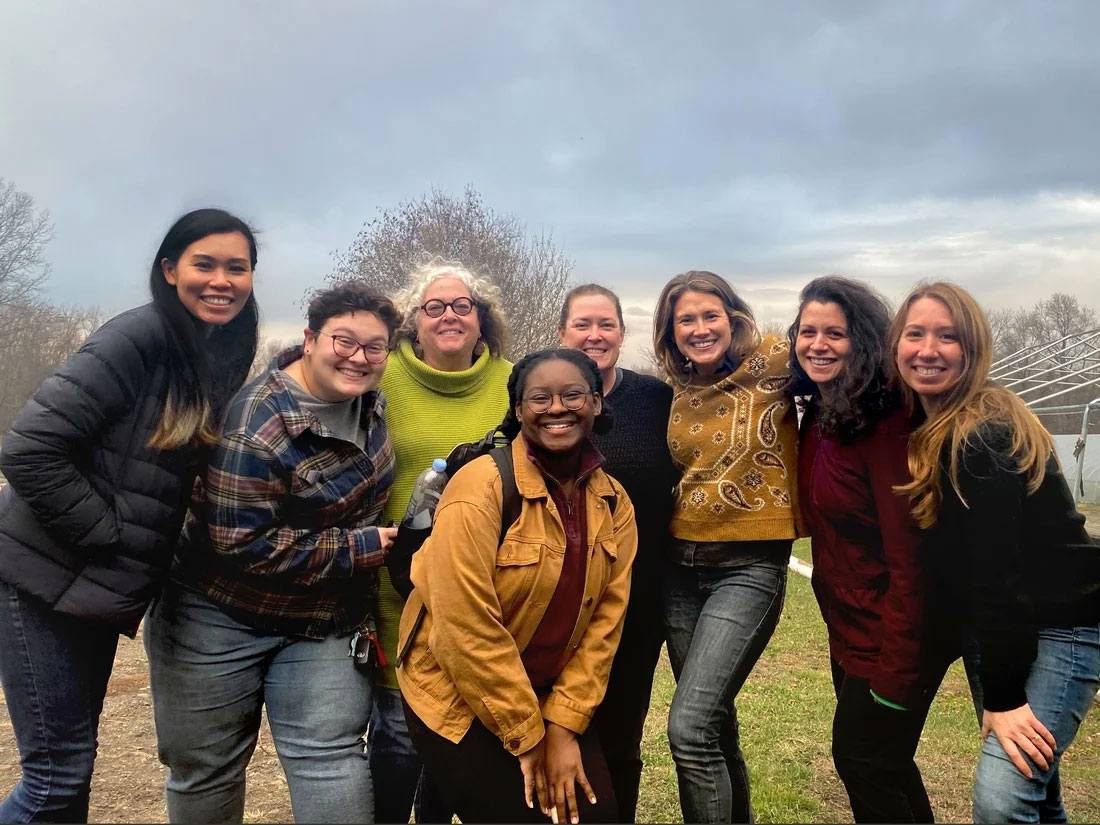
From Capstone to Career
Among the many agencies Santino worked with to develop the educational program that served as their master’s thesis was City Seed—a nonprofit in New Haven focusing on sustainable agriculture, community and economic development. That connection led to accepting a position as manager of City Seed’s emergent food entrepreneurship program and working with early-stage entrepreneurs—many of whom are women, recent immigrants and people of color—to help them launch their food businesses.
It’s a role Santino is imminently equipped to handle. “All my life I’ve had to hustle and put out fires. Then I had the chance to study the interconnectedness of social issues in the food program. Now I’m drawing on both those experiences to support people in launching their food businesses—it’s a perfect culmination.”
A Syracuse University Story by Sarah H. Griffin originally published on June 14, 2022
Congratulations Class of 2022
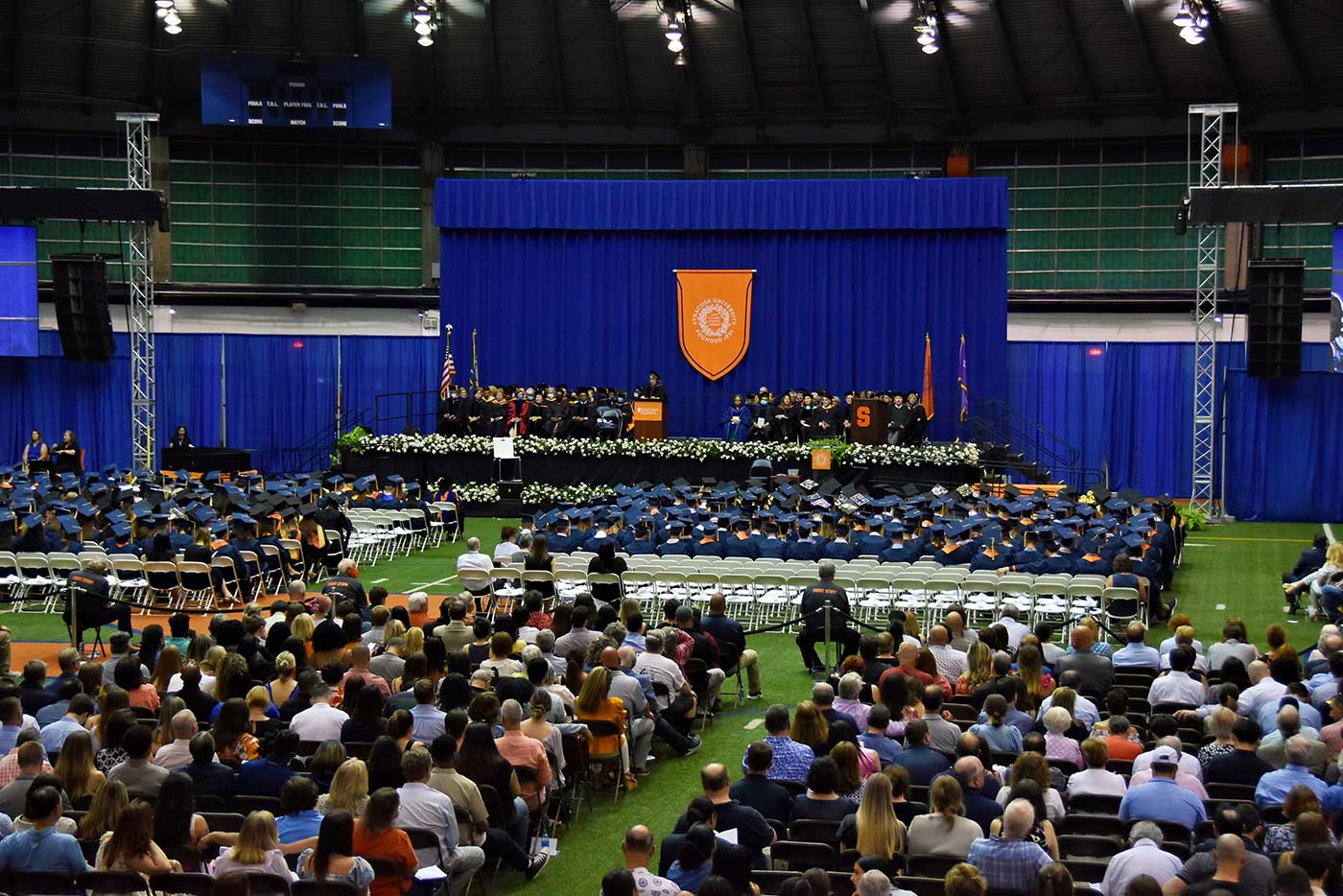
325 undergraduates;
131 masters candidates;
24 students earning certificates of advanced study, and;
4 Ph.D. students.
Through the month of May, departments across Falk College honored student achievements and celebrated the graduating Class of 2022, which are detailed on individual department websites.
Falk College Convocation was held Saturday, May 14 at Manley Field House. Falk College Convocation, other college convocations, and the May 15 Syracuse University Commencement ceremony, were recorded and are available to view on the Syracuse University commencement website and is also included below.
Falk College Convocation | Saturday, May 14 | 4:30 p.m. ET
Falk College Convocation Photos
Class of 2022 Undergrad and Grad Food Studies Honors
The Falk College food studies program would like to congratulate the following Class of 2022 award winners:
Chef’s Prize: Avalon Gupta VerWiebe
This is awarded to a Food Studies graduate who demonstrates exceptional ability in the culinary arts. This ability should also include food justice and community engagement goals of the Food Studies Program. Avalon came on board as a lab assistant in FST 304: Farm to Fork. In the class she showed great enthusiasm for the culinary aspects of food systems and helped students manage the kitchen environment and connect the topics from seminar to the cooking in the lab. Avalon was also instrumental in a Foraging panel discussion event which included food foraged locally. In addition, her practicum with Syracuse Onondaga Food Systems Alliance and her work the Onondaga Nation youth leading sessions about food justice support her culinary activities.
Food Justice Award: Anna Zoodsma
This is awarded to a Food Studies graduate who demonstrates the ability to successfully address food justice related issues through a variety of mediums. Throughout her time in the Food Studies master’s degree program, Anna has demonstrated a consistent commitment to creating social change through the food system. In her practicum work with Salt City Harvest farm, a local organization that provides farmland to New Americans in the Syracuse area, she has devoted her project to looking at the relationship between community mental health and farming for refugees. In this work, she also volunteers at the farm and is providing her research to the organization to help them access further support and funding.
Community Engagement Award: Erica Rose Lushan
This is awarded to a Food Studies major or minor who demonstrates the ability to create or implement progressive food-based initiatives which engage diverse politics locally, nationally, or internationally. Erica is doing her practicum with Syracuse City School District learning about food service budgets. She strategically uses the budget to help plan, produce, transport, and distribute meals for every student.
Culture and Commensality Award: Rose Noterman
This is awarded is given to the Food Studies major who has expanded the Food Studies program to new audiences by sharing food knowledge and practice through social activism. Rose is engaged in her classes and is passionate about creating positive change in all food system studies.
Research Award: Phoebe Ambrose
This is awarded to a Food Studies major who produces a research project and paper of exceptional quality. The paper should address substantial issues regarding the sustainability of the food system including food justice, human rights or ecological, economic and social impacts of food production, consumption, processing and distribution. Phoebe did research regarding Pete’s Giving Garden and Hendrick’s Food Pantry to promote grassroots change to address campus food insecurity, strengthen the community through collective service, and encourage sustainability.
Roseane do Socorro Gonçalves Viana Human Rights Award: Ellen Pitstick and Michelle Tynan
Viana Human Rights Award for the best graduate paper on the human right to food, nutrition, and/or health. Selection to be made by a committee: of two or three; headed by someone other than Anni Bellows from the Food Studies Program. Roseane do Socorro Gonçalves Viana, Brazilian nutritionist and right to adequate food activist and writer, left a powerful message of hope and belief in the essential goodness of each and every person, of the need to take on our individual and collective responsibilities to ensure the welfare and dignity of all and for each and every one, that all struggles are important and must be respected, and, most of all, that the voices of the affected must be heard. Michelle received one of the Viana Human Rights Paper Awards this year for her paper, “The H-2A Guestworker Visa Program and the Human Right to Just and Favorable Work.” Ellen won the other Viana Human Rights Paper Award for her study, “Will they get my snail of approval? Slow Food and the Human Right to Food.” Both papers fill important gaps of food justice analysis by using an international policy frame that global food activists are employing to leverage their work.
And the Winners Are…
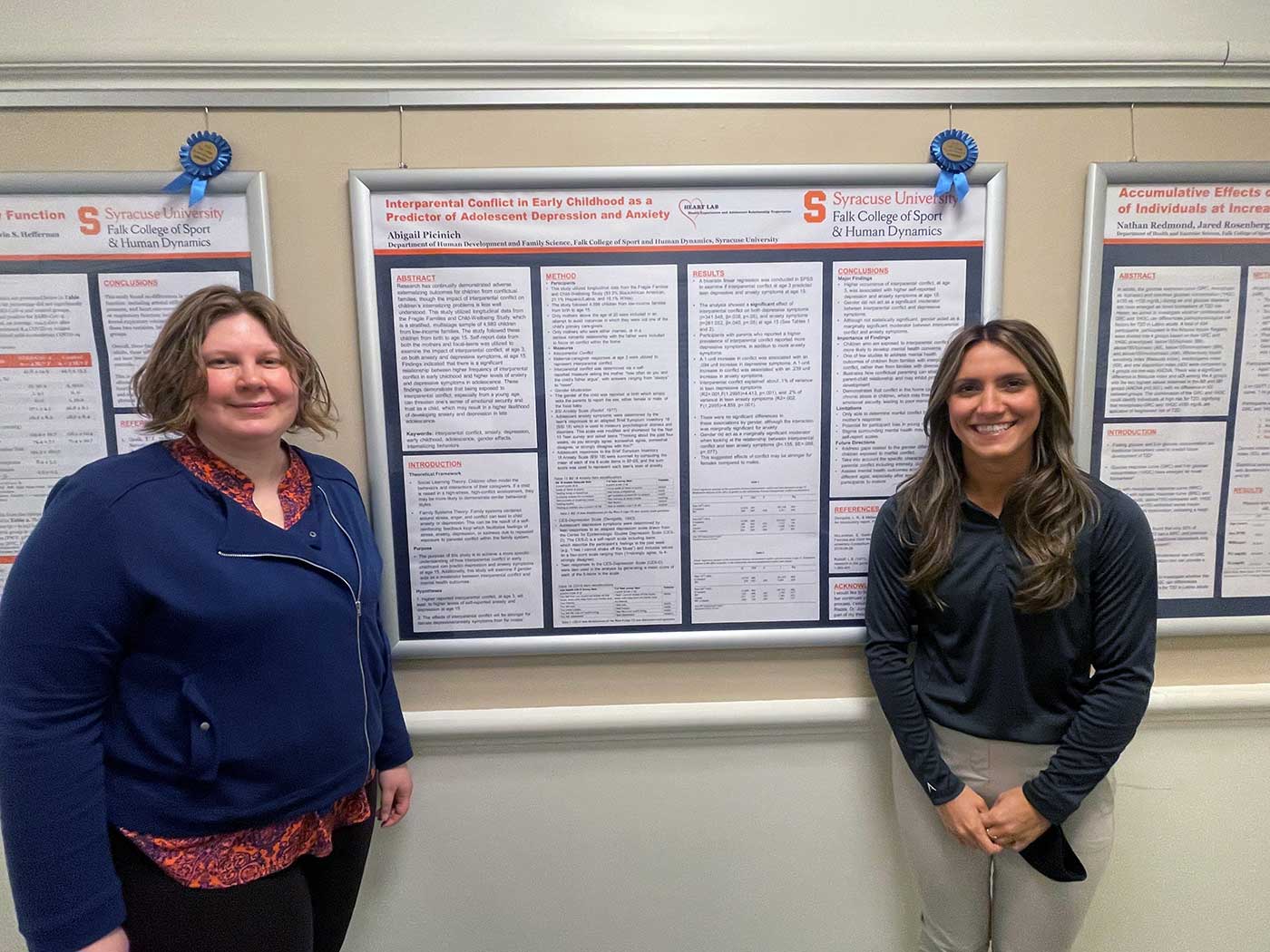
With a record 66 poster submissions, picking the winners of the sixth annual Falk Student Research Celebration was more difficult than ever.
“I have to thank the (Research Celebration) committee–that was a tough job to decide,” says Sara Vasilenko, the committee chair and an assistant professor in the Department of Human Development and Family Science. “The incredible participation shows the vitality of the research that’s being done at Falk.”
Held virtually March 29, the Research Celebration highlighted students’ research collaborations with their faculty mentors. Undergraduate, master’s and doctoral students who are enrolled in a Falk degree, minor or CAS (Certificate of Advanced Study) submitted electronic posters of completed or in-progress empirical, exploratory, policy analytic, systematic review, or hypothesis-driving research projects using qualitative, quantitative, or mixed methods for display.
The committee selected nine winners – three each in the undergraduate, graduate and doctoral categories (the winners are listed at the end of this story). Kathryn Gratien, research operations specialist in the Falk College Research Center and a member of the Research Celebration committee, says the winning posters are displayed on the third floor of White Hall in the Falk Complex, across from the Research Center (Room 344).
“Congratulations to all the students and faculty mentors for an outstanding virtual display of research projects,” Gratien says. “We are so excited that the interest and participation in the Falk Student Research Celebration keeps growing each year and thank you to all the students and their mentors for their hard work and high-quality poster submissions.”
The posters were judged by the Research Celebration committee, which is comprised of faculty and staff. Faculty mentors who are on the committee did not participate in rating their students’ posters.
“I want to thank all of the faculty members who were involved in mentoring the students,” Vasilenko says. “There’s so much great research happening at Falk involving students, and that’s something the faculty should be really proud of.”
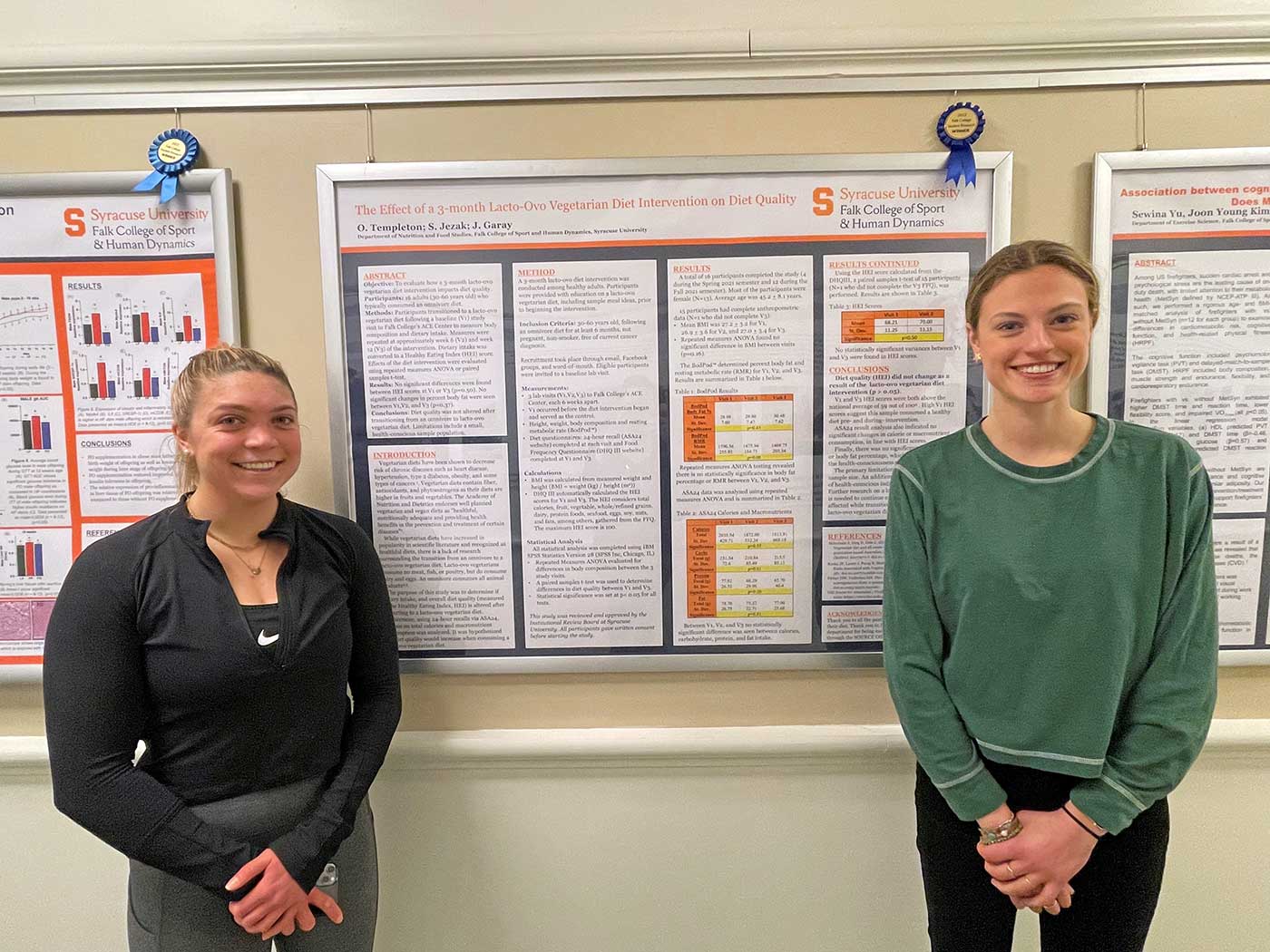
2022 Falk Research Celebration Winners
Undergraduate Student Poster Winners
Accumulative Effects of Novel Biomarkers on Identification of Individuals at Increased Risk for Type 2 Diabetes (T2D)
Names: Nathan Redmond, Jared Rosenberg and Professor Joon Young Kim
Program/Major: Health and Exercise Science
Faculty Research Mentor: Professor Joon Young Kim
The Effect of a 3-month Lacto-Ovo Vegetarian Diet Intervention on Diet Quality
Names: Olivia Templeton and Samantha Jezak
Program/Major: Nutrition Science
Faculty Research Mentor: Professor Jessica Garay
Association between Cognitive Function and Metabolic Syndrome in US Firefighters: Does Metabolic Syndrome (MetSyn) Matter?
Names: Sewina Yu, Professor Joon Young Kim and Myong-Won Seo
Program/Major: Health & Exercise Science
Faculty Research Mentor: Professor Joon Young Kim
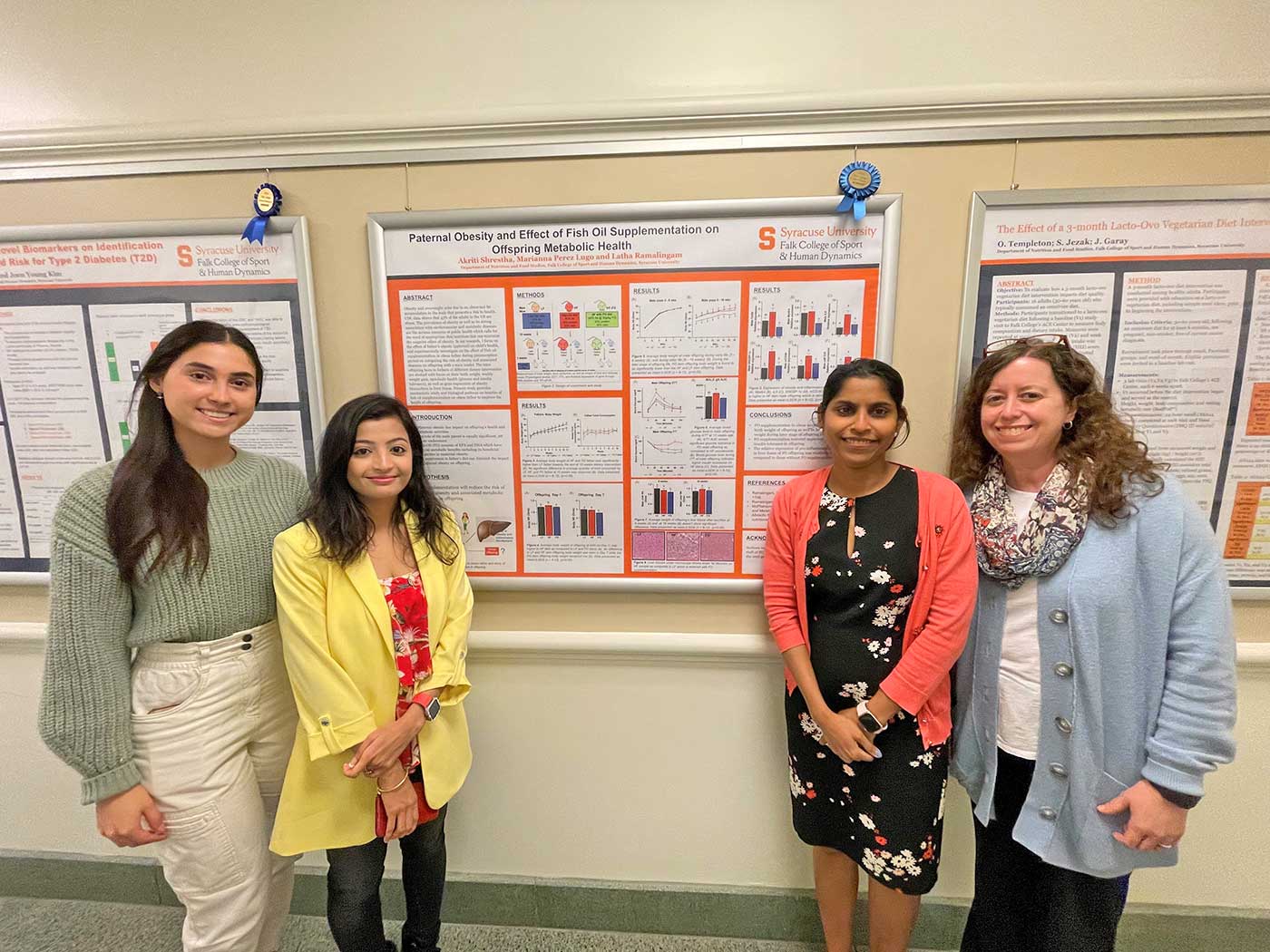
Graduate Student Poster Winners
Risks and Protective Factors for Veterans’ PTSD, Mental Well-being, and Substance use During the COVID-19 Pandemic
Names: Jacqueline Allen, Professor Xiafei Wang and Professor Ken Marfilius
Program/Major: Social Work
Faculty Research Mentor: Professor Ken Marfilius
Interparental Conflict in Early Childhood as a Predictor of Adolescent Depression and Anxiety
Name: Abigail Picinich
Program/Major: Human Development and Family Studies
Faculty Research Mentor: Professor Sara Vasilenko
Paternal Obesity and Effect of Fish Oil Supplementation on Offspring Metabolic Health
Names: Akriti Shrestha, Mariana Perez Lugo and Professor Latha Ramalingam
Program/Major: Nutrition Science
Faculty Research Mentor: Professor Latha Ramalingam
Doctoral Student Poster Winners
Cardiac Autonomic Modulation in Healthy Young Adults With and Without History of COVID-19
Names: Burak Cilhoroz, Sydney Brackett, Leah Rozumov, Sophia Luchs, Zachary Greely and Professor Kevin Heffernan
Program/Major: Exercise Science
Faculty Research Mentor: Professor Kevin Heffernan
Examining Cardiometabolic Disease Risk in Normal Weight (NW) and Overweight/Obese (OB) Individuals: Results from 2017-2020 NHANES
Names: Lindsey Clark, Myong-Won Seo and Professor Joon Young Kim
Program/Major: Exercise Science
Faculty Research Mentor: Professor Joon Young Kim
The Effect of SARS-CoV-2 Infection on Cardiorespiratory Function
Names: Andrew Heckel, Danielle Arcidiacono, Kailee Coonan, Jacob DeBlois, Alaina Glasgow and Professor Kevin Heffernan
Program/Major: Exercise Science
Faculty Research Mentor: Professor Kevin Heffernan
About the Falk College Research Center
The Falk College Research Center promotes a robust, collaborative research community in which students play an active role. At Falk, graduate and undergraduate students have the opportunity to work directly with faculty to collect data, analyze findings and draw conclusions on relevant topics surrounding public health, food studies, nutrition, sport management, human development and family science, social work, exercise science, and marriage and family therapy.
A More Sustainable Campus
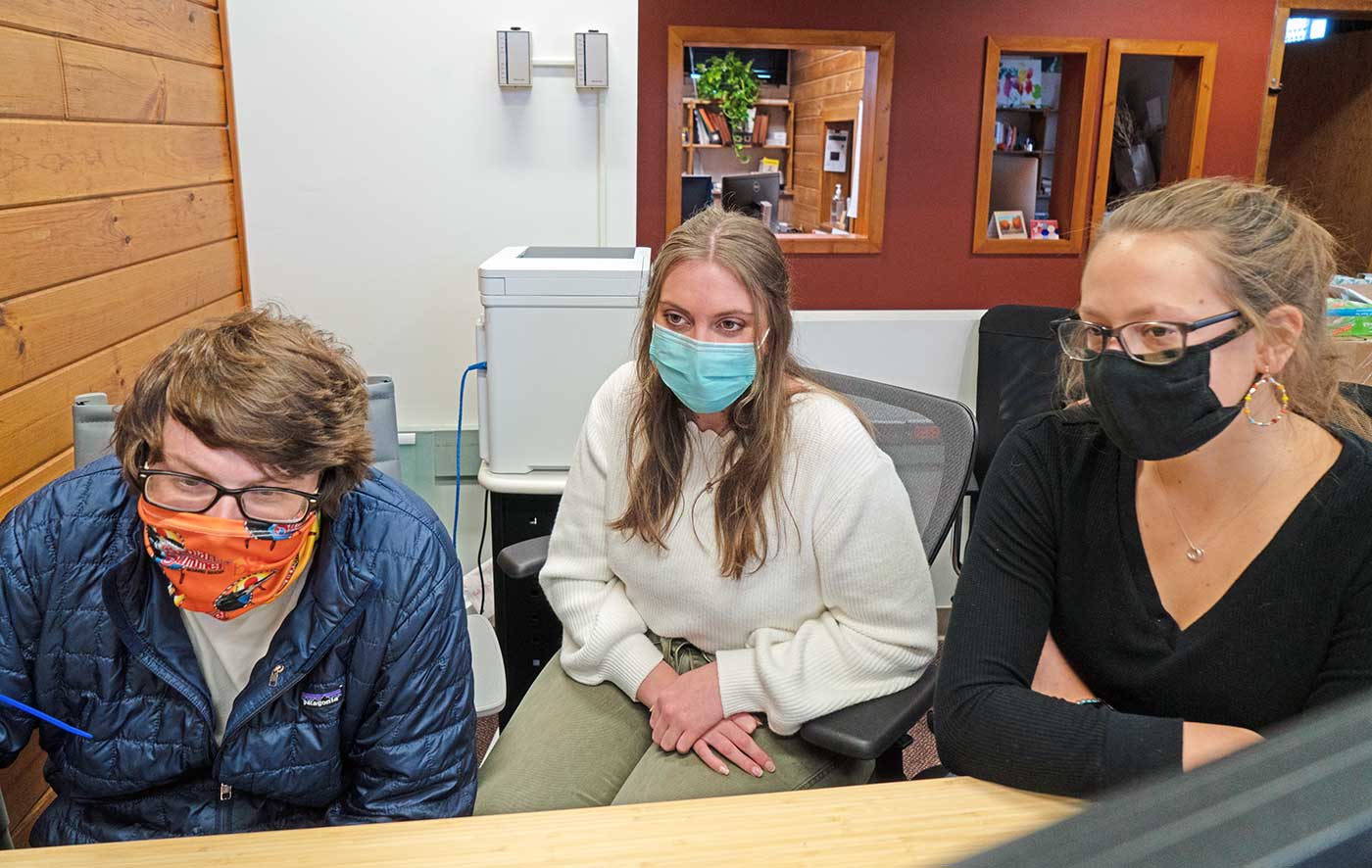
Before they graduate and make an impact in the world, Falk College seniors Claire Rein, Tucker Kopp and Caroline King made their impact on the Syracuse University campus as interns with the University’s Sustainability Management team.
Rein, Kopp and King interned in the Fall 2021 semester through Sustainability Management’s for-credit internship program that allows students to pursue projects that complement their major and explore their interest in sustainability.
“Our internship program is designed to allow students to explore their passions outside of the classroom environment while recognizing the broad impact sustainability has on all majors,” says sustainability coordinator Meg Lowe G’18, who manages the internship program. “At the same time, each project a student works on helps us achieve our goals with a current program or develop a new initiative on campus.”
Rein’s internship project focused on reducing plastic consumption, Kopp explored food insecurity, and King drafted a plan to implement more renewable energy on campus. Rein, who transferred to Syracuse in the fall of 2019, says her internship has so far been the highlight of her Syracuse experience.
“My internship made up for many of the things that I missed out on (because of pandemic restrictions),” Rein says. “I have incredibly supportive and friendly supervisors, as well as other amazing student interns that have made my experience so amazing! While I have learned a lot by doing my research project, I have also gained both a professional network and some great friendships.”
Sustainability Management works with each student’s advisor to ensure the internship aligns with the student’s academic goals, and a single internship can offer the chance to become immersed in several aspects of sustainability.
“We work closely with academic advisors to ensure we’re meeting the needs of every program,” Lowe says. “We hope each student walks away with a thorough understanding of sustainability in a way they can carry it throughout their life.”
As the three Falk College students concluded their internships, they shared more about their projects and experiences with us. Here are their stories:
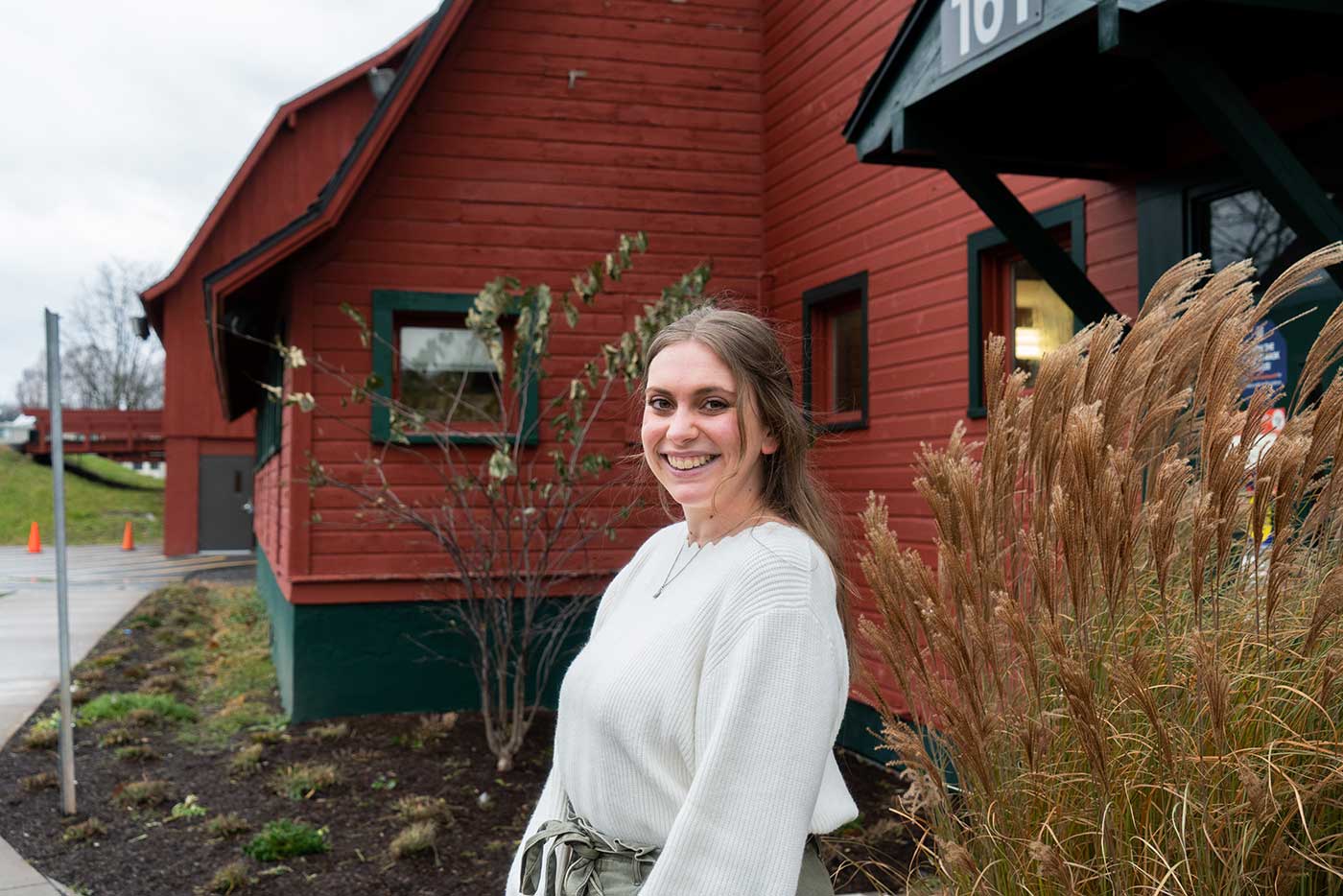
Claire Rein: Set Up for Success
Growing up in Syracuse just a few miles from the University, Rein enjoyed singing, dancing, playing musical instruments and, of course, attending Syracuse Orange sporting events. She was attracted to Falk College’s Department of Public Health because of its experiential learning–the “the real-life application of knowledge” that she says has prepared her for a successful career in medicine.
“In my studies of public health, I have gained significant knowledge about the American healthcare system, healthcare disparities and social determinants of health, and how to do scientific research,” says Rein, who currently works as a patient care technician at St. Joseph’s Hospital in Syracuse. “I have been able to work with a high school equivalency class, participate in PTSD research, work at the Office of Sustainability Management for my internship, and much more.”
For her internship project on reducing plastic consumption on campus, Rein researched microplastics and their connection to public health, the issues with plastic recycling, and the social justice issues surrounding the plastic industry. She determined that aluminum cans are the best alternative and created a proposal for the University to transition to aluminum packaging for its vending machines.
“While the goals of recycling are great, the actual implementation does not match up,” Rein says. “Oftentimes, recyclables get contaminated and never end up being recycled, meaning they are either put in a landfill, incinerated, or end up polluting the natural environment.
“The industry was never designed to support such a large volume of recyclables,” Rein adds, “so our lack of recycling infrastructure in America has made it so that it’s sometimes not worth it economically to recycle.”
As she looks forward to graduation, Rein says she wants to positively influence the healthcare sphere by improving the experience for patients who are often overlooked and vulnerable.
“This could be, for example, implementing policies within my practice to better educate care plans to people with low healthcare literacy or language/cultural barriers; focusing care plans on the individual needs, perspectives and abilities of the patient; or finding ways to prevent socio-economic status from hindering the ability to receive excellent long-term care,” Rein says. “I believe being a public health major at Syracuse has really set me up for success when it comes to achieving these goals.”
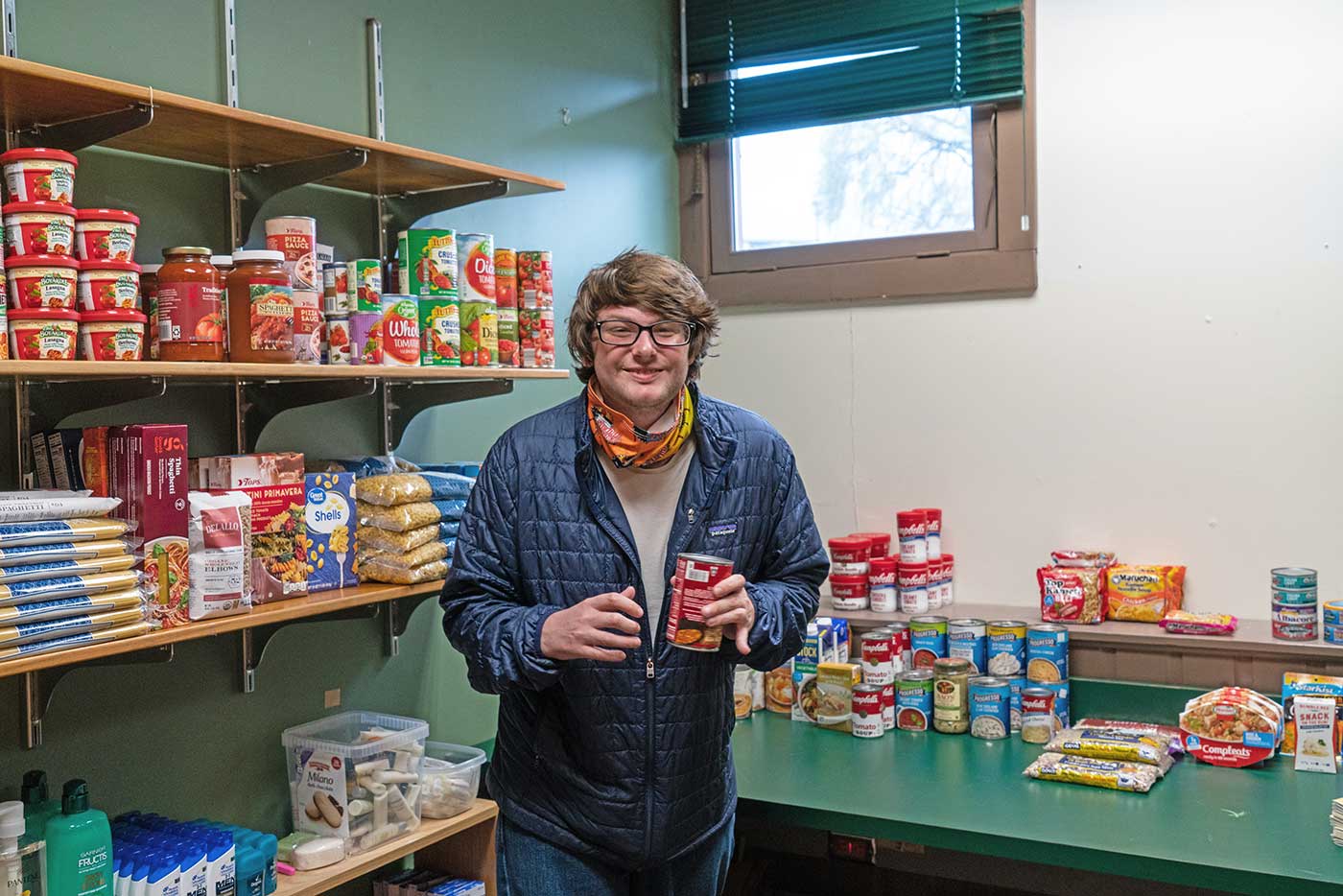
Tucker Kopp: Ending Food Insecurity
Kopp grew up about 20 miles southeast of Syracuse in Cazenovia, where he started to ride horses when he was just 3. He also enjoyed baking and would spend hours baking with a friend, who sadly passed away last year.
Kopp enrolled at Syracuse University through InclusiveU, which provides opportunities for students with intellectual and developmental disabilities who want to experience college life in a fully inclusive setting. Kopp is a Food Studies major at Falk College, where his passion for baking and food is matched only by his enthusiasm for making friends.
“I’m a people person,” Kopp says, “I love to meet new people and make friends.”
Kopp is in his internship year at InclusiveU, and with Sustainability Management he studied food insecurity on college campuses. As Kopp points out, the Hendricks Chapel food pantry at Syracuse is stocked with food and personal care items that are available at no cost to all students with a valid Syracuse University or SUNY ESF ID.
“The most important thing I wish people knew about food insecurity on a college campus is how to use a food pantry if you don’t have enough money to buy food for yourself,” Kopp says.
InclusiveU Director Brianna Shults says Kopp grew “personally and professionally” from his internship, which was a valuable piece of his experience at the University and tied together his certificate in Culinary Arts with his career goals.
“After working alongside Meg (Lowe) and his other colleagues, Tucker better understands where food comes from and how hard it can be for some to access it,” Shults says. “Tucker valued his opportunities to participate in other projects, such as the virtual cooking class. His work at Sustainability Management really allowed him a new view on how food is experienced and accessed outside of traditional food services.”
Kopp’s education at Falk and his internship with Sustainability Management has given him options as his looks forward to his life and career after graduation.
“I want to do something with horses,” Kopp says. “But if that doesn’t work out, I want to do something culinary-related!”

Caroline King: Quality Healthcare for All
King grew up in the mountains of central Pennsylvania, where hiking and backpacking trips became her favorite hobby (she and her father still go on multiple backpacking trips every year). She entered Syracuse as a nutrition student but switched to a dual major in public health at Falk and policy studies at the Maxwell School of Citizenship and Public Affairs.
“As I aged, I began learning more about health disparities and the adversities faced in the healthcare system by minority communities,” King says. “I quickly developed a passion to be a part of the shift to providing equitable, affordable access to quality healthcare for all.
“Additionally, public health includes the health of the environment, which was an added attraction as my connection to the earth is strong,” King says.
For her internship, King researched renewable energy (RE) from a public health perspective. She looked at the sustainability of RE throughout its entire life cycle, from sourcing precious metals to the disposing of end-of-life RE systems.
With the information she gathered, King drafted a policy to propose to the University to use more RE on campus.
“I wish people would take the time to think about their energy consumption, where it’s coming from, and how big of an impact it’s causing on the planet,” King says. “It’s easy to put your consumption out of mind when the effects are out of sight, however, we need to be conscious of the impact that the things we do and purchase have on other people and the environment.”
King is a Renée Crown Honors Program student and member of the Phi Sigma Pi Gender-Inclusive National Honors Fraternity, where she has met students with various majors who share her vision of being part of a team that makes a difference in the lives of others.
“I wish people would understand the privilege they have to live the life they do so that they are able to empathize with people of all types around them,” King says. “As I move through jobs, careers and life, I hope to be in a position where I can be a part of a team that makes a large impact on a community, population or the environment.”
Falk Hosts Sports Nutrition Expert
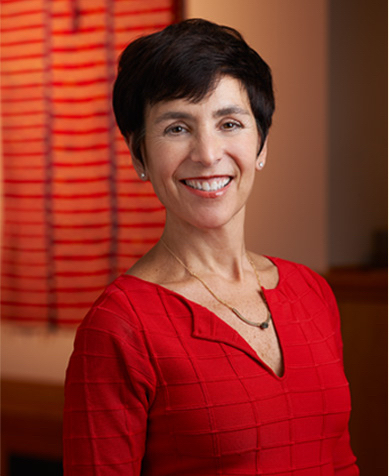
Nationally known sports nutrition expert Leslie J. Bonci will present “Fuels of Engagement: Nutrition Trends That Should Stay and End” at 6:30 p.m. Thursday, April 14, in Grant Auditorium at the Falk College complex.
Bonci is the featured speaker of the sixth annual Ann Selkowitz Litt Distinguished Speaker Series. The lecture is free and open to the public, and light refreshments will be served at 5:30 p.m.
“I am so honored and excited to speak at Syracuse University and honor the legacy and memory of a colleague, a pioneer and a wonderful sports registered dietician, Ann Litt,” Bonci says. “My topic is ‘Fuels of Engagement,’ which will focus on how to strategize, optimize and realize goals through food choices and eating habits activation.
“How can we tune out the misinformation, create order out of chaos, eat within our means and make progress without unintended consequences?” Bonci adds. “Individualization with food choices should nurture, empower, enable and complement lifestyle, health, and well-being in an affordable, available, accessible and actionable manner.”
Bonci, MPH, RD, CSSD, LDN, is the owner of Active Eating Advice, a nutrition consulting company, and co-founder of Performance 365, a sports nutrition consulting company. Her clients include the National Dairy Council, California Dried Plum Board, Bayer USA, Produce for Better Health Foundation, National Peanut Board, Gatorade, GoodSport, Ready Nutrition, General Mills and KLEAN Athlete.
She is currently the nutrition consultant for the 2020 Super Bowl champion Kansas City Chiefs and the Fan Controlled Football (FCF) indoor league. She was previously the company nutritionist for Pittsburgh Ballet Theatre and sports dietitian for Carnegie Mellon University athletics and the WNBA, NFL’s Pittsburgh Steelers, NHL’s Pittsburgh Penguins, and Major League Baseball’s Pittsburgh Pirates, Toronto Blue Jays and 2019 World Series champion Washington Nationals.
To get a sense of Bonci’s presentation April 14, watch these videos on the Active Eating Advice website to observe Bonci working with athletes to help them be their best, mentoring children to help them cultivate and create an atmosphere of food appreciation, and communicating general wellness strategies around fueling for activity.
Bonci received a Bachelor of Science degree in biopsychology from Vassar College and a Master of Public Health degree in nutritional epidemiology from the University of Pittsburgh. The author of several popular fitness and nutrition books, Bonci is a regular blogger for U.S. News & World Report’s Eat + Run webpage and hosts weekly television and radio segments for KDKA television and radio in Pittsburgh.
A sought-after national and international speaker, Bonci is an advocate for programs that address food and nutrition insecurity, and an advocate for agricultural biotechnology and sustainability. She is a firm believer in evidence-based practice over sensationalism and incorporates equity, diversity and relevance into her presentations and practice.
Here are the details:
What: Sixth annual Ann Selkowitz Litt Distinguished Speaker Series.
When: 6:30 p.m. Thursday, April 14 (light refreshments at 5:30 p.m.).
Where: Grant Auditorium in the Falk College complex at Syracuse University (campus map).
Who: Sports nutrition expert Leslie J. Bonci will present “Fuels of Engagement: Nutrition Trends That Should Stay and End.”
Parking: Free parking is available in the Stadium Lot off Raynor Avenue. (Directions to Stadium Lot).
For more information and accommodations requests, please contact Annette Hodgens at ahodgens@syr.edu or 315.443.9816.
About the Ann Selkowitz Litt Distinguished Speaker Series
Ann Selkowitz Litt ’75 (1953-2007) was a nationally known nutritionist who helped children and adolescents with eating disorders and assisted developing athletes in reaching their full potential. The nutrition consultant to CosmoGirl magazine, Litt was the author of The College Students’ Guide to Eating Well on Campus, Fuel for Young Athletes, and the American Dietetic Association Guide to Private Practice. She was the nutritionist for the NFL’s Washington Redskins and served as spokesperson for several media campaigns during her career, including the Got Milk campaign. After her death, the Ann S. Litt Foundation, Inc., was created to support nutrition education. Through a generous gift from this foundation to Falk College, the Ann Selkowitz Litt Distinguished Speaker Series was created at Syracuse University in 2015.
Page 5 of 18
